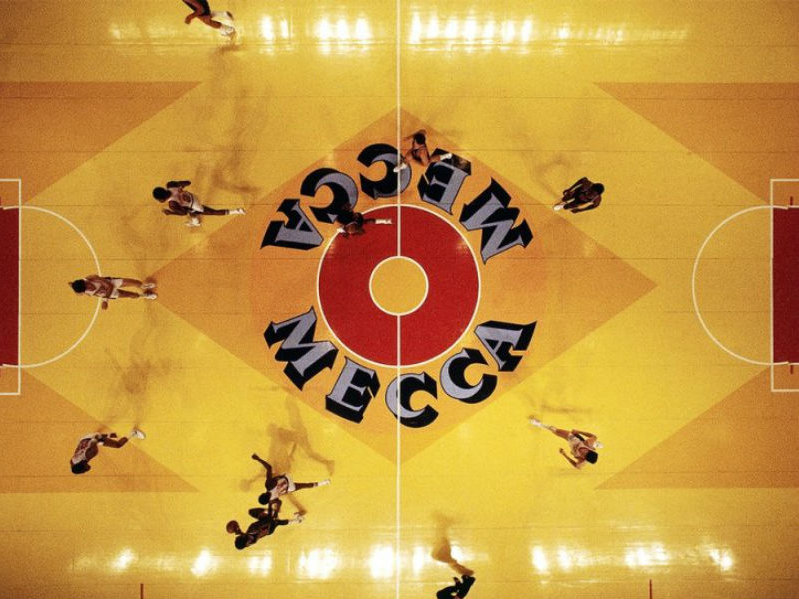When the Bucks announced over the summer that, in celebration of the team’s 50th anniversary, they would play a game at the MECCA this season, it got us to thinking about Milwaukee arenas and basketball history – especially as the franchise’s future venue is being built just down the street from its previous two buildings. Who were the best players from the old MECCA years? What about those from the more recent Bradley Center era?
The MECCA hosted some of the best basketball Milwaukee’s ever seen – from the 1971 NBA Championship to the stretch of seven straight division titles in the '80s – during its time as the Bucks’ home court (1968-88). Since the team’s move to the Bradley Center in 1988, there’s been significantly less success – though the 2001 Eastern Conference Finals team had plenty of individual talent, and the current squad has shown the league huge potential.
When Giannis Antetokounmpo and the rest of the Bucks move into their new arena – scheduled to be completed in time for the start of the 2018 season – they’ll undoubtedly make their mark on and leave plenty of memories at the yet-unnamed building.
Until then, to commemorate the great players who hooped at the MECCA, as well as those that balled at the BC, here is our completely subjective, open-to-disagreement but nevertheless-authoritative All-Arena teams for both venues. (Note: The selection process was so difficult that we actually had to pick second teams; also, we used the current All-NBA format of choosing two guards, two forwards and a center, then we added a sixth man and a coach for each team.)
Click here for the Bucks’ All-Bradley Center teams.
All-MECCA First Team
Guard: Oscar Robertson (1970-74) – The Big O was acquired by Milwaukee in 1970, and that season he teamed with Kareem Abdul-Jabbar to bring a title to the city. The Bucks won at least 59 games in each of Robertson’s four years, he made three All-Star teams and retired with the NBA record for triple-doubles (181) – which stood until Russell Westbrook broke it last season. His time in Milwaukee was brief, but he made a major impact.
Guard: Sidney Moncrief (1979-89) – A five-time All-Star, four-time All-NBA Second Teamer and two-time Defensive Player of the Year, Moncrief was one of the best players ever to put on a Bucks jersey. He ranks third in franchise history in scoring, with 11,594 total points. In Moncrief’s 10 seasons in Milwaukee, the Bucks made the playoffs every year and had the third-best overall record in the league with him as their undisputed leader.
Forward: Marques Johnson (1977-84) – A four-time All-Star in Milwaukee who ranks fourth in franchise history in scoring average (21.0 points per game), Johnson helped the Bucks to five division titles and a few deep playoff runs during his seven-year tenure. A pioneer of the so-called "point-forward" role that Antetokounmpo now plays, Johnson was ultimately traded for the other forward on this team. He's back now, though, as an excellent color analyst on the Bucks' television broadcasts.
Forward: Terry Cummings (1984-89, 1995-96) – A two-time All-Star for the Bucks, Cummings came over in the Johnson trade and averaged at least 20 points and eight rebounds in four of his first five seasons in Milwaukee. One of the most talented power forwards in the league, Cummings could have been among the organization’s all-time greats if injuries hadn’t hurt his career.
Center: Kareem Abdul-Jabbar (1969-75) – The undisputed best Bucks player ever and one of the NBA’s legends, Abdul-Jabbar was a three-time MVP in Milwaukee who holds franchise records for points (14,211), rebounds (7,161) and scoring average (30.4). He also has the league scoring record (38,387). Then known as Lew Alcindor, he led the Bucks to the 1971 NBA Championship and was named the Finals MVP, remaining a dominant force for the team until being traded for, among others, the next guy on this list.
Sixth man: Junior Bridgeman (1975-84, 1986-87) – The organization’s all-time leader in games played (711), Bridgeman spent 10 seasons with the Bucks, helping to bridge the gap between the Abdul-Jabbar and Moncrief eras. Although he was a sixth man for most of his career, Bridgeman averaged double-figures in scoring for nine consecutive seasons in Milwaukee and was as consistent a player as any the Bucks have had.
Coach: Larry Costello (1968-77) – During Costello’s nine-year tenure as the Bucks’ original head coach, he guided them to the playoffs six times and, of course, the 1971 NBA Championship – the team’s first and only title. Costello’s overall winning percentage (.608) ranks second among all Milwaukee coaches.
Milwaukee Bucks’ All-MECCA Second Team
Guard: Brian Winters (1975-83) – In his eight years in Milwaukee, Winters was a two-time All-Star who averaged 16.7 points per game and helped the Bucks to six postseason appearances. Winters ranks eighth in franchise history in points (9,743) and is in the top five in games (582), assists (2,479) and steals (718).
Guard: Jon McGlocklin (1968-76) – The high-arcing sharpshooter led Milwaukee in scoring during its inaugural season, made the All-Star team in 1969 and helped it to the title in 1971. A Bucks broadcaster for the past 37 seasons, McGlocklin has been with the organization since the beginning and seen it all during his long and distinguished career.
Forward: Bob Dandridge (1969-77, 81) – A member of the Bucks’ 1971 championship team and three-time All-Star in Milwaukee, Dandridge ranks among the club's top-10 all-time in 10 major offensive categories. The Greyhound averaged 18.6 points, 7.3 rebounds and 3.2 assists in nine seasons with the Bucks, being named to the NBA All-Defensive First Team and All-NBA Second Team in 1979.
Forward: Paul Pressey (1982-90) – A phenomenal defender (All-Defensive First Team from 1985-86, All-Defensive Second Team in 1987) with a well-rounded offensive game, Pressey was a playmaking forward who remains the Bucks’ all-time leader in assists (3,272) and is second in steals (894).
Center: Bob Lanier (1980-84) – Lanier played five seasons in Milwaukee, won five division titles and provided the team much-needed veteran leadership in the playoffs. He is ninth on the Bucks’ postseason scoring list (680 points), tied for sixth in rebounding (342) and tied for third in blocked shots (45), and he went on to win the Oscar Robertson Leadership Award and be inducted into the Basketball Hall of Fame.
Sixth man: Ricky Pierce (1984-91, 97-98) – An offensive super-sub who twice won the league’s Sixth Man of the Year award in Milwaukee, Pierce averaged 16.5 points on 51.6 percent shooting over his 969 games with the Bucks, exemplifying the best of a bench role.
Coach: Don Nelson (1976-87) – During Nelson’s 11 seasons, the Bucks made the playoffs nine times and advanced to the Eastern Conference Finals in three of the years. He won NBA Coach of the Year in 1983 and 1985 and his .611 regular-season winning percentage ranks first in franchise history.
Those are the Milwaukee Bucks' All-MECCA teams. Agree? Disagree? Let us know in the comments, and be sure to check out the All-Bradley Center Teams.
Born in Milwaukee but a product of Shorewood High School (go ‘Hounds!) and Northwestern University (go ‘Cats!), Jimmy never knew the schoolboy bliss of cheering for a winning football, basketball or baseball team. So he ditched being a fan in order to cover sports professionally - occasionally objectively, always passionately. He's lived in Chicago, New York and Dallas, but now resides again in his beloved Brew City and is an ardent attacker of the notorious Milwaukee Inferiority Complex.
After interning at print publications like Birds and Blooms (official motto: "America's #1 backyard birding and gardening magazine!"), Sports Illustrated (unofficial motto: "Subscribe and save up to 90% off the cover price!") and The Dallas Morning News (a newspaper!), Jimmy worked for web outlets like CBSSports.com, where he was a Packers beat reporter, and FOX Sports Wisconsin, where he managed digital content. He's a proponent and frequent user of em dashes, parenthetical asides, descriptive appositives and, really, anything that makes his sentences longer and more needlessly complex.
Jimmy appreciates references to late '90s Brewers and Bucks players and is the curator of the unofficial John Jaha Hall of Fame. He also enjoys running, biking and soccer, but isn't too annoying about them. He writes about sports - both mainstream and unconventional - and non-sports, including history, music, food, art and even golf (just kidding!), and welcomes reader suggestions for off-the-beaten-path story ideas.







